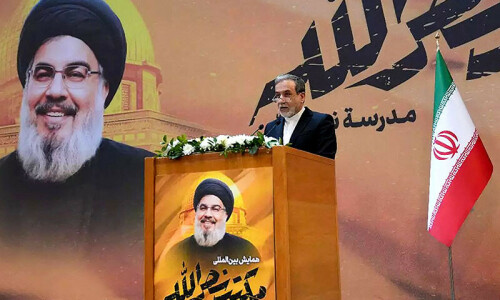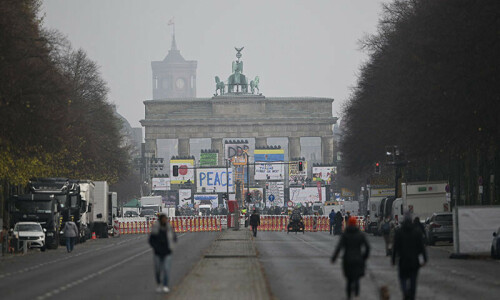 The PPP-led coalition government has decided to extend sovereign guarantees to the local and foreign investors to undertake development projects under the public-private partnership (PPP) programme.
The PPP-led coalition government has decided to extend sovereign guarantees to the local and foreign investors to undertake development projects under the public-private partnership (PPP) programme.
The much talked about public-private partnership did not take off during the last two years despite the fact that a separate organisation -Infrastructure Project Development Facility (IPDF)-was created by the ministry of finance.
The IPDF and the Planning Commission had jointly proposed a number of initiatives to start new mega development projects under the PPP but the idea could not attract investors in the absence of certain protection sought by them.
“This was in that backdrop the government decided to extend sovereign guarantees to the investors to ensure their participation in the development activities through PPP programme”, Deputy Chairman Planning Commission Salman Faruqi told Dawn.
Giving details, he said that no favour would be done to any local and foreign investors and that they would have to compete with each other to get contracts for various projects. There would be international competitive bidding to award contracts in a transparent manner.
Facing financial constraints, the government would like to see during the current financial year that a substantial development work would be carried out through public-private partnership”, Mr Faruqi said.
“The Planning Commission would no more be in the business of proposing allocation for development projects,” he said. It would serve only as a think tank and a facilitator to help remove the financial difficulties of the government.When approached, the Minister for Finance and Privatisation, Syed Naveed Qamar said that the new Rs550 billion Public Sector Development Programme (PSDP) was being drastically cut to ease the government’s funding problems. Up to Rs100 billion cut will be applied on the PSDP as the government has no option to manage resources.
“We have come to the conclusion that development activities must be undertaken through public private partnership programme and in this behalf we will be offering every possible facility to the investor”, Mr Qamar said.
The deputy chairman said that the IPDF has to be made a vibrant organisation in the next few weeks; its job would be to advertise the details of any project to be undertaken through PPP.
“I am sure this process will generate interest of the investors to become co-sponsors in development projects. For example, if it does not work, the government would provide funding for any project”, Mr Faruqi said.
However, he said that since all the necessary protection and cover to the investors would be given by extending sovereign guarantee, the PPP was bound to take off preferably during the current financial year.
Responding to a question, the deputy chairman Planning Commission agreed that IPDF could not deliver in the presence of number of concerns of the investors, though details of hundreds of projects had been worked out just on papers. There would be no restriction to finalise any development project by a single company or a group of companies or consortium.
“There will be an open bidding for every project and the lowest bidder or bidders will be awarded contract in a highly transparent manner before the newsmen,” he said adding that the culture of secretly deciding things for favouring certain individuals or a companies needed to be eliminated to attract investment.
The chief executive of Thar coal project, Mr Aslam Sanjrani when approached said that things were being finalised on fast track basis to undertake the project. He said Mr Boyed of USAID had conducted a feasibility study in 1993 for Thar coal reserves and given his report to the ministry of water and power in July 1994 which was then submitted to the then caretaker prime minister Moeen Qurashi.
“But it was the job of any investor to conduct a feasibility study which was promised to be undertaken by Hong Kong-based investor Mr Gorden Wu”, he said.
Nevertheless, the pre-feasibility was eventually conducted by Shenwa, a state-owned Chinese company. Its 180 engineers came to Pakistan and had done a lot of work and given a bid of 5.75 cents per kilowatt hour but Wapda and NEPRA insisted to approve it at 5.34 cents.
The issue was then again taken up by the Shaukat Aziz government but no decision was taken.
The Chinese government during this period kept asking Pakistan to decide the issue as Shenwa was about to be privatised. “They did not take any decision and the company withdrew from the project after having been privatised”, he said.
“But now things have changed after the Washington conference held last month that attracted a big number of US and European investors in which Prime Minister Gilani also participated”, he said.
Another conference would be held in October in Hong Kong after which international bidding would take place to award the contract for the development of Thar coal and putting a power plant there.
He said, after the conference, expression of interests (EoIs) will be invited. The good thing about the project is that it will be supported by the International Finance Company (IFC) — a private arm of the World Bank. It would be on the pattern of India where IFC had offered 80 per cent funding to the investors for different projects.
He said 5000MW of electricity was expected to be produced from Thar coal. There could be the development of four blocks, each having 1000MW of power. To a question, he said Nepra would determine the tariff structure after which the project will be started hopefully within this calendar year.
While the federal government would give the sovereign guarantee for the project, its entire royalty would go to the Sindh province, he said.









































Dear visitor, the comments section is undergoing an overhaul and will return soon.